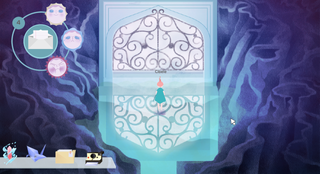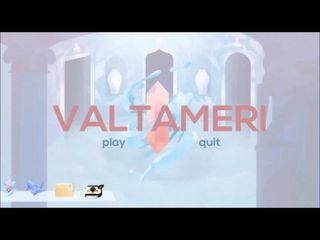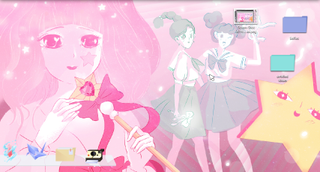Cibele is a game about falling in love with someone in an MMO

This weekend at PAX I stepped away from the crush of people in the main venues to see something much more quiet and intimate—Nina Freeman’s narrative experience Cibele. In the lobby of one of the nearby hotels she gave me her laptop studded with kawaii decora stickers, her old pair of Marshall headphones, and I played the first 20 minutes of her newest game: an autobiographical story about her relationship with a boy she’d met in an MMO when she was 19 who she would eventually meet up with in real life and have sex with.
Nina works for Gone Home creator Fullbright as her day job, and has made a few independent games, including How Do You Do It?, a game in which you play an 11-year-old girl using her dolls to try and figure out how sex works. I talked with Nina about her background telling stories that were disarmingly personal, like her other game, Freshman Year, that centered around her experience being sexually harassed at a bar.
Her new project, Cibele, is being made with a five-person team. The game takes its title from the player-character Nina inhabits in Valtameri, the fictional stand-in for the real MMO Freeman played in 2009. Booting the game takes you to a desktop, a replication of her own circa 2009, where you read emails, check a few folders full of the ephemera of a girl with a blog and an interest in poetry and anime, and finally log in to the game, which is where the main body of the narrative takes place. In-game you meet a friend you’ve made, a boy with a red anime-knight avatar named Ichi, and you pick up a conversation with him as you click on enemies and flit around the game.

The pastel color scheme, the simple clicking to move, the peaceful music, and the cutesy octopi I killed as we moved around the area all evoked a very specific memory for me: playing the Korean MMO Ragnarok back when I was in high school. Any teenager alive and online during the anime boom of the mid-to-late 2000s will probably have a similar moment of familiarity, and maybe nostalgia. In the FMV sequences with Nina in her bedroom, there are Sailor Moon and Macross posters I remembered from my own adolescence. When we met to discuss her game, Nina was dressed like a shojo character, matching the seafoam greens and cotton candy pinks I saw in Valtameri.
Near the end of my time with the game, the boy you’ve been chatting with finally cajoles you into taking a picture of yourself.
The metanarrative at play in Cibele is centered on the emotional experience of being a teenage girl, writing poetry, taking pictures of yourself, and overthinking them. There are emails from boys and friends in your inbox, selfies and documents full of Livejournal-style blog entries scattered on your in-game desktop. Near the end of my time with the game, the boy you’ve been chatting with finally cajoles you into taking a picture of yourself. There’s an FMV of Nina going to get her camera, examining herself in her bedroom mirror, and something a lot of women and girls will recognize with uncomfortable familiarity: lifting your shirt up and looking at your stomach, hoping it passes someone’s standards.
Playing Cibele, and talking to Nina, I thought about how feminine this game was. We discussed the coding of it, how a reluctant, late acceptance of her own femininity had colored her own life and now her game.
Cibele takes place in a very specific moment in time of someone’s life, and according to Nina doesn’t necessarily set out to say anything specific about modern love or relationships, just about her's. She isn’t interested in speaking for others, just in conveying a part of her own life with an honesty and clarity that she hopes will evoke understanding from the player.
The biggest gaming news, reviews and hardware deals
Keep up to date with the most important stories and the best deals, as picked by the PC Gamer team.
Making the game seemed like a way for her to sort through her own feelings and come to terms with how this relationship began, progressed, and ended, and she’s tried to portray both herself and her former boyfriend as whole people rather than caricatures. Instead of having the entirety of their relationship laid out for dissection, she’s opted to have three 20-30 minute vignettes that take place at different parts of their time together.

Cibele had a confessional, almost painful intimacy. Even though I responded to it on a personal level, Nina and her team seemed hopeful that they’d made something that was very personal but also has a degree of specificity and honesty would make it relatable to anyone. Even though I've never had this kind of relationship with anyone, the brief time I spent in it with this game made me think of my own time as a teenager who came of age online and had formative social experiences with people through MMOs and message boards and early forms of social networks.
Cibele doesn’t set out to say something broad about relationships, but rather tells the story of a very specific time in a person’s life. Some of the people who respond to it will do so viscerally, while others may have trouble connecting with such a personal statement. Either way, it’s a game that will provoke conversation.
You can find all of our coverage from PAX Prime 2015 right here.
Most Popular

